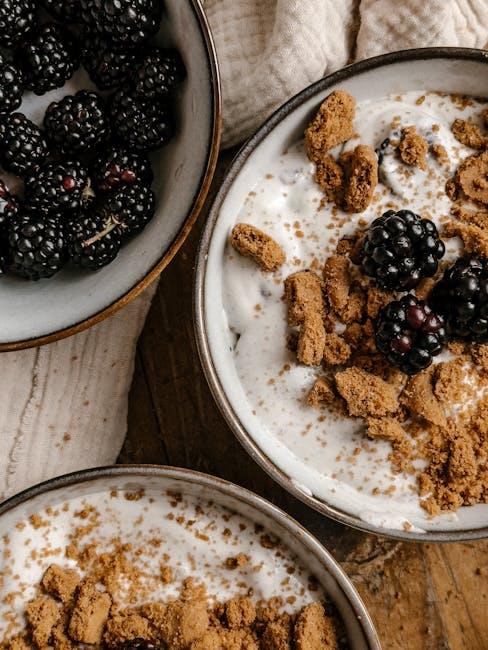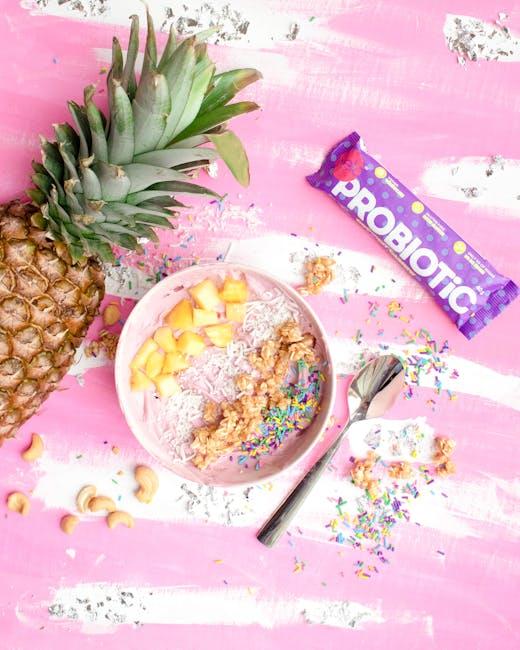In today’s fast-paced world, maintaining optimal gut health has become a priority for many individuals seeking to improve their overall well-being. With an increasing awareness of the vital role that probiotics play in supporting a healthy digestive system, people often find themselves at a crossroads: should they incorporate probiotic-rich foods into their diet, or opt for the convenience of probiotic supplements? Understanding the differences between these two options can be both empowering and overwhelming. This article aims to guide you through the intricacies of probiotic foods versus supplements, helping you make informed decisions that align with your lifestyle and health goals. By exploring the benefits, limitations, and unique characteristics of each, we hope to offer clarity and support on your journey towards a healthier gut and a happier you.
Understanding the Benefits of Probiotics for Gut Health
Probiotics have become a buzzword in the realm of gut health, with numerous options available to incorporate them into your daily routine. But how do you decide between consuming probiotic-rich foods and opting for supplements? Let’s delve into the unique benefits and considerations of each.
Probiotic Foods: Foods like yogurt, kefir, sauerkraut, and kimchi are not only delicious but also packed with live bacteria that can enhance your gut flora. These options are often accompanied by essential nutrients such as vitamins and minerals, contributing to overall health. Some advantages include:
- Natural Source: Consuming probiotics through food means you’re getting them in their natural form, often accompanied by fiber and other beneficial nutrients.
- Culinary Enjoyment: Incorporating these foods into meals can make for a delightful and varied diet.
- Cost-Effective: Typically, purchasing probiotic-rich foods can be less expensive than supplements.
Probiotic Supplements: These come in various forms like capsules, powders, and liquids, offering a concentrated dose of beneficial bacteria. Supplements can be particularly useful for those with dietary restrictions or specific health goals. Consider the following:
- Convenience: Easy to consume and can be taken without altering your diet.
- Targeted Strains: Many supplements are formulated with specific strains to address particular health concerns.
- Consistency: Supplements provide a reliable dose of probiotics, which can be beneficial for maintaining a steady intake.
| Aspect | Probiotic Foods | Probiotic Supplements |
|---|---|---|
| Source | Natural, whole foods | Manufactured, concentrated |
| Ease of Use | Incorporated into meals | Quick and convenient |
| Cost | Generally lower | Can be higher |

Exploring the Nutritional Profiles of Probiotic Foods and Supplements
When diving into the world of probiotics, it’s essential to understand the distinct nutritional profiles offered by probiotic foods and supplements. Probiotic foods, such as yogurt, kefir, and sauerkraut, are not only rich in beneficial bacteria but also provide additional nutrients that enhance overall health. These foods are often sources of vitamins, minerals, and fibers, which support a balanced diet. For instance, yogurt is packed with calcium and protein, while fermented vegetables like kimchi offer an array of antioxidants and vitamins.
On the other hand, probiotic supplements are designed to deliver a concentrated dose of specific bacterial strains, often tailored to target particular health concerns. Supplements can be a practical option for those with dietary restrictions or preferences that limit their intake of probiotic-rich foods. They offer a controlled and measurable way to consume probiotics, ensuring consistent intake of the desired strains and quantities.
| Nutrient | Probiotic Foods | Probiotic Supplements |
|---|---|---|
| Vitamins & Minerals | High | Low |
| Fiber | High | None |
| Bacterial Strain Variety | Varies | Specific |
| Convenience | Moderate | High |
- Key Takeaway: Choose probiotic foods for a holistic approach to nutrition, or opt for supplements for targeted and convenient probiotic intake.

Identifying the Best Sources of Probiotics for Your Lifestyle
Finding the perfect source of probiotics that aligns with your lifestyle can be a journey of exploration. Whether you are a busy professional, a dedicated athlete, or someone simply aiming for a healthier gut, choosing between probiotic foods and supplements can be pivotal. Each option offers unique benefits and challenges, and understanding them can help you make an informed decision.
Probiotic Foods are natural and often delicious ways to boost your gut health. They include:
- Yogurt: A classic choice, rich in beneficial bacteria.
- Kefir: A tangy drink loaded with probiotics and nutrients.
- Sauerkraut: Fermented cabbage that adds zest and probiotics to meals.
- Miso: A fermented soybean paste used in soups and sauces.
- Kombucha: A fermented tea that offers a refreshing probiotic-rich option.
Probiotic Supplements provide a convenient alternative, especially for those with dietary restrictions or specific health goals. They come in various forms like capsules, powders, and liquids, often containing a higher concentration of probiotics than food sources. Here’s a quick comparison:
| Aspect | Probiotic Foods | Probiotic Supplements |
|---|---|---|
| Convenience | Requires meal planning | Easy to consume anytime |
| Variety | Wide range of flavors | Limited to supplement form |
| Concentration | Lower probiotic count | Higher probiotic count |
| Additional Nutrients | Contains vitamins and minerals | Focuses on probiotics only |
Ultimately, the choice between probiotic foods and supplements depends on your personal preferences, dietary needs, and lifestyle. Consider experimenting with both to discover what works best for your body and routine. Remember, a balanced approach can often yield the most rewarding results.

Making Informed Choices: When to Choose Foods Over Supplements
In the quest for better gut health, many people find themselves weighing the benefits of probiotic foods against those of probiotic supplements. While both can play a role in maintaining a healthy digestive system, understanding when to choose one over the other is key to making informed choices. Probiotic foods, such as yogurt, kefir, sauerkraut, and kimchi, offer a natural source of beneficial bacteria. These foods not only provide probiotics but also come with additional nutrients, like vitamins and minerals, that can enhance overall health. Furthermore, consuming these foods is often more enjoyable and can easily be incorporated into daily meals, offering a holistic approach to nutrition.
On the other hand, probiotic supplements can be a convenient option for those with dietary restrictions or specific health needs. They allow for precise dosing and often contain a wider variety of bacterial strains compared to food sources. For individuals with lactose intolerance or those who follow a vegan diet, supplements can provide an alternative way to ensure they are receiving enough probiotics without consuming dairy or animal-based products.
- Convenience: Supplements can be taken on-the-go, while foods require preparation.
- Nutritional Benefits: Foods offer additional nutrients; supplements offer targeted strains.
- Dietary Preferences: Choose foods for enjoyment and supplements for dietary restrictions.
| Aspect | Probiotic Foods | Probiotic Supplements |
|---|---|---|
| Nutrient Content | High in vitamins & minerals | Limited to probiotics |
| Variety of Strains | Limited | Wide variety |
| Convenience | Requires preparation | Quick & easy |








































